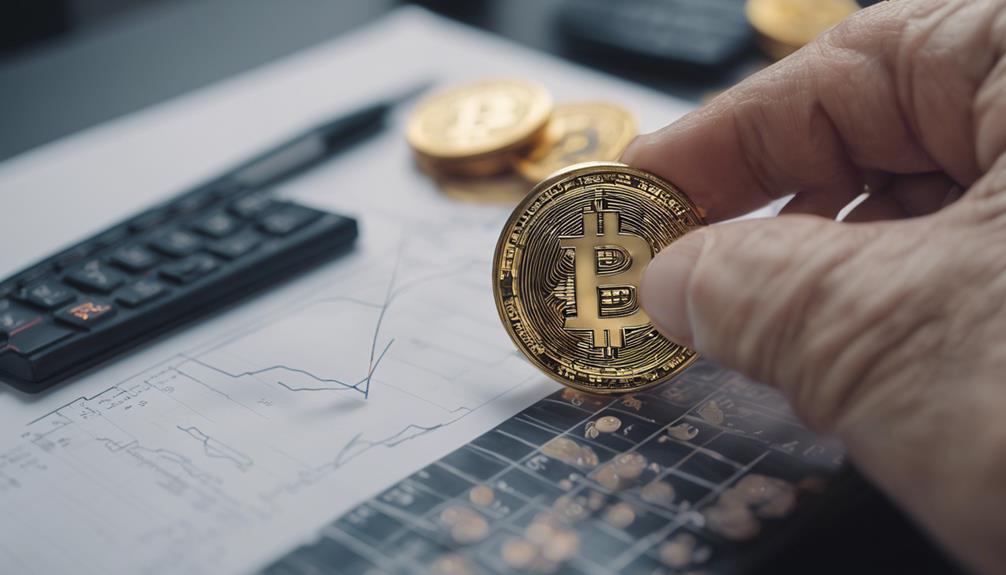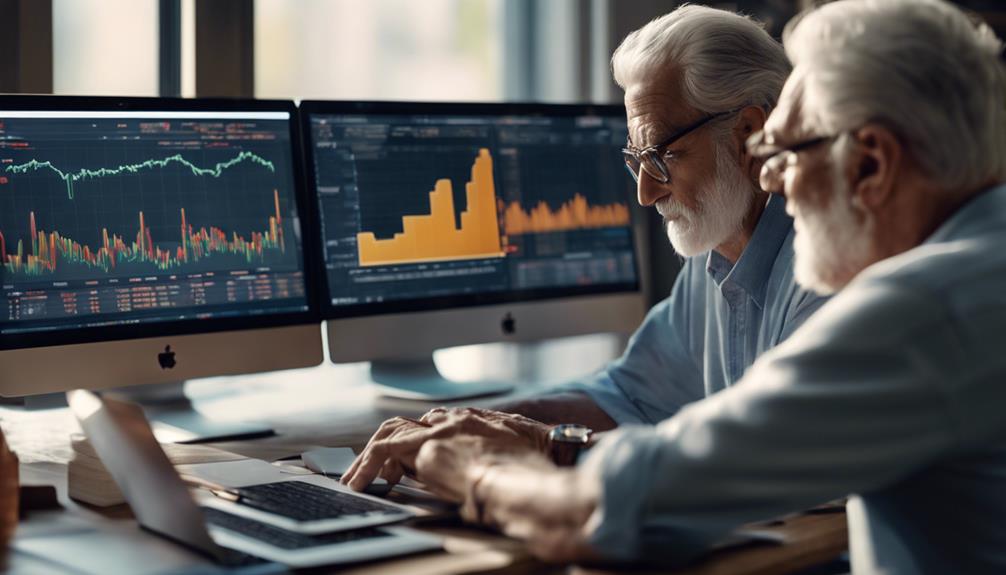In the realm of retirement planning in the era of cryptocurrencies, Bitcoin IRAs offer distinct opportunities and risks. They come with tax benefits similar to traditional IRAs, serve as a safeguard against inflation, and allow for portfolio diversification. Nonetheless, volatility, regulatory uncertainties, and security threats pose significant risks that must be considered. Strategies to mitigate these risks include diversification and choosing reputable custodians. It is crucial to understand the tax implications and select a custodian as initial steps. To determine if Bitcoin IRAs are suitable for your retirement plan, evaluate the growth potential against market complexities and align investments with your long-term financial objectives. Take advantage of innovative blockchain technologies and the potential appreciation of assets.
Key Takeaways
- Bitcoin IRAs offer tax advantages and diversification for retirement.
- Risks include volatility, regulatory uncertainties, and security threats.
- Mitigate risks through diversification and reputable custodians.
- Consider tax implications, fees, and long-term investment horizon.
- Growth potential from exposure to blockchain technology and asset appreciation.
Understanding Bitcoin IRAs

When considering retirement planning, it is important to understand the concept and mechanics of Bitcoin IRAs. These self-directed retirement accounts offer investors the opportunity to include Bitcoin in their portfolios. Bitcoin IRAs can be either custodial or non-custodial, providing varying levels of control over assets. Similar to traditional IRAs, Bitcoin IRAs offer tax benefits such as tax-deferred growth and potential advantages upon retirement. However, investors should be aware of associated fees, including account setup, maintenance, and transaction fees.
In setting up a Bitcoin IRA, individuals must carefully assess factors such as risk tolerance and diversification strategies. Understanding one's risk tolerance is vital in determining the appropriate allocation of Bitcoin within the overall retirement portfolio. Diversification strategies should be employed to mitigate risks and optimize returns. Additionally, choosing a reputable custodian is critical to ensure the security and legitimacy of the Bitcoin IRA. By considering these factors, investors can make informed decisions to maximize potential returns while effectively managing risks associated with Bitcoin IRAs.
Benefits of Bitcoin IRAs

Bitcoin IRAs provide a range of benefits for investors seeking to enhance their retirement planning strategies. These benefits include:
- Tax Advantages: Bitcoin IRAs offer tax benefits similar to traditional IRAs, allowing for tax-deferred growth.
- Hedge Against Inflation: Investors can protect their retirement savings from the eroding effects of inflation by holding Bitcoin in their retirement accounts.
- Diversification: By diversifying a retirement portfolio with Bitcoin IRAs, investors can potentially achieve high returns and reduce overall risk.
- Reputable Custodians: Working with trustworthy custodians guarantees the security and legitimacy of the investment, providing peace of mind for investors.
- Long-Term Investment Horizon: Bitcoin IRAs are suited for a long-term investment horizon, allowing investors to capitalize on the growth potential of cryptocurrencies over time.
Risks and Mitigation Strategies

Amidst the dynamic landscape of cryptocurrency investments, it is imperative for individuals considering Bitcoin IRAs to carefully assess the associated risks and implement strategic mitigation measures. Risks inherent in Bitcoin IRAs include volatility, regulatory uncertainty, security threats, and liquidity issues.
To address these challenges, investors can employ various mitigation strategies. Diversification of investments is a vital tactic to spread risk across different assets and reduce the impact of market fluctuations on the overall portfolio. Choosing reputable custodians can enhance security measures and safeguard investments against potential threats such as hacking and phishing attacks.
Additionally, maintaining a long-term investment horizon can help navigate regulatory uncertainties in the cryptocurrency space, which may influence the value and legality of Bitcoin IRAs. Moreover, being mindful of liquidity issues is essential, as a lack of buyers or sellers in the market can hinder the ability to trade Bitcoin within an IRA effectively.
Tax Considerations for Bitcoin IRAs

Given the tax benefits similar to traditional IRAs, understanding the tax implications of Bitcoin IRAs is essential for optimizing savings and avoiding potential issues. Bitcoin IRAs offer tax-deferred growth and potential tax advantages, making them a valuable retirement investment vehicle.
When considering Bitcoin IRAs, individuals should be aware of the following tax considerations:
- Gains from Bitcoin investments in IRAs are taxed at retirement, allowing for tax-deferred growth over time.
- Consultation with a tax professional is recommended to navigate the tax implications effectively.
- Tax-efficient strategies can be implemented to maximize returns and manage tax liabilities.
- Understanding the tax implications is vital to optimize tax savings and ensure compliance with regulations.
- Bitcoin IRAs provide retirement tax benefits similar to traditional IRAs, emphasizing the importance of strategic tax planning for long-term financial security.
Choosing a Custodian

When opting for a custodian for your Bitcoin IRA, it is crucial to take into account factors such as custodian selection tips and security measures checklist.
These elements can assist investors in evaluating the reliability and trustworthiness of the custodian, ensuring the secure storage and management of their digital assets.
Custodian Selection Tips
In the domain of Bitcoin IRAs, selecting a custodian demands careful consideration of factors such as reputation, security protocols, and fee structures. When choosing a custodian for a cryptocurrency IRA, it is important to assess the custodian's ability to provide secure storage solutions, including options like cold storage and insurance coverage. To make an informed decision, compare custodians based on their reputation, regulatory compliance, and transparent fee structures.
Look for custodians with a strong track record in managing digital assets, positive customer reviews, and a demonstrated commitment to regulatory requirements. Make sure that the custodian you choose has a reliable reputation in the industry, a history of secure asset management, and clear fee structures for handling Bitcoin IRAs.
- Reputation
- Security protocols
- Fee structures
- Regulatory compliance
- Insurance coverage
Security Measures Checklist
Selecting a custodian for your Bitcoin IRA necessitates prioritizing robust security measures to safeguard your digital assets effectively. When choosing a Bitcoin IRA custodian, look for providers that offer cold storage solutions for private keys and utilize multi-signature wallets to enhance security.
It is important to verify that the custodian has insurance coverage to protect against potential losses from hacks or theft. Additionally, confirm the custodian adheres to cybersecurity best practices and industry standards to safeguard your investments.
Prioritize custodians with a proven track record of protecting client assets and maintaining high levels of security. By following these guidelines and selecting a custodian that implements strong security measures, you can better secure your Bitcoin IRA and mitigate risks associated with digital asset investments.
Self-Directed Vs Full-Service

Investors have the choice between self-directed and full-service Bitcoin IRAs for managing their cryptocurrency investments within a retirement account. When deliberating between the two options, individuals need to contemplate several key factors:
- Self-directed Bitcoin IRAs: Investors have control over their cryptocurrency investments within the retirement account, allowing for a hands-on approach to investment management.
- Full-service Bitcoin IRAs: Professional guidance and management are provided, catering to investors who prefer a more passive investment strategy.
- Fees: Self-directed accounts may incur higher fees due to the responsibility of managing investments independently, whereas full-service IRAs may charge fees for their expert guidance.
- Market Trends: Full-service IRAs offer insights into cryptocurrency market trends and potential investment opportunities, which can be beneficial for investors seeking expert advice.
- Comfort Level: Investors should assess their comfort level with managing cryptocurrency investments to determine whether a self-directed or full-service Bitcoin IRA is more suitable for their retirement planning.
Getting Started With a Bitcoin IRA

To start on the journey of establishing a Bitcoin IRA, individuals must first identify a reputable custodian specializing in self-directed IRA services for cryptocurrencies. Understanding IRS regulations, risk assessment, and diversification strategies is important for investors venturing into the domain of Bitcoin IRAs. This table outlines key steps for getting started with a Bitcoin IRA:
| Step | Description | Importance |
|---|---|---|
| Find a reputable custodian | Locate a trustworthy provider offering self-directed IRA services for Bitcoin investments. | Essential |
| Understand IRS regulations | Comprehend the tax implications and rules set forth by the IRS for Bitcoin within retirement accounts. | Crucial |
| Assess risk tolerance | Evaluate individual risk appetite to determine suitable investment strategies for a Bitcoin IRA. | Critical |
Best Practices for Management

Effective management practices are essential for optimizing a crypto retirement portfolio, ensuring long-term growth and risk mitigation. To navigate the financial complexities of Bitcoin IRAs successfully, consider the following best practices:
- Diversify your retirement portfolio: Spread investments across different cryptocurrencies to reduce risk and maximize returns.
- Implement risk management strategies: Use tactics like dollar-cost averaging and setting stop-loss orders to protect against downside risk in volatile crypto markets.
- Consult a financial advisor: Seek professional guidance to make informed decisions about allocating funds to high-risk investments like cryptocurrencies within your IRA.
- Balance your cryptocurrency holdings: Maintain a mix of established cryptocurrencies such as Bitcoin and Ethereum to optimize your portfolio's performance.
- Establish a traditional retirement savings foundation: Prioritize building a stable financial base through traditional retirement savings before venturing into high-risk investments like cryptocurrencies.
Is Bitcoin IRA Suitable for You?

When contemplating a Bitcoin IRA, it is essential to evaluate your eligibility based on IRA criteria and assess your risk tolerance regarding the volatile nature of cryptocurrencies.
Understanding the potential growth opportunities that Bitcoin IRAs offer can help align your long-term investment goals with the risks involved.
IRA Eligibility Criteria
Based on specific eligibility criteria, evaluating whether a Bitcoin IRA is suitable for you involves assessing your possession of a self-directed retirement account that permits alternative investments. It is crucial to weigh various factors before deciding on a Bitcoin IRA, such as:
- Possession of a self-directed IRA or 401(k)
- Ability to invest in alternative assets
- Interest in diversifying with digital assets
- Seeking tax-deferred growth opportunities
- Understanding IRS regulations and risk tolerance
Risk Assessment Factors
Investors contemplating a Bitcoin IRA must carefully evaluate their risk tolerance, investment horizon, and understanding of cryptocurrency to determine the suitability of this retirement investment option.
Evaluating the potential benefits of tax-deferred growth and diversification against the risks of volatility and regulatory uncertainty is important. Consultation with a financial advisor can provide valuable insights into aligning a Bitcoin IRA with long-term investment strategies.
Individuals need to ponder their risk appetite and willingness to navigate the complexities of the cryptocurrency market before opting for a Bitcoin IRA. Reviewing if this investment aligns with retirement goals and financial situation requires a detailed analysis of these risk assessment factors.
Making an informed decision about Bitcoin IRAs involves a thoughtful consideration of these key elements to establish a suitable long-term investment strategy.
Potential Growth Opportunities
Considering the potential growth opportunities presented by Bitcoin IRAs, individuals looking to diversify their retirement portfolios may find this investment option appealing. Bitcoin IRAs offer significant growth potential over the long term, with historical performance showcasing Bitcoin as a high-return investment.
Long-term investors can benefit from exposure to innovative technologies such as blockchain through Bitcoin IRAs. The volatility in digital assets like Bitcoin can provide capital appreciation opportunities for retirement portfolios within Bitcoin IRAs.
In addition, including cryptocurrencies in a retirement portfolio via Bitcoin IRAs can enhance overall returns by diversifying investment options and offering exposure to alternative assets. This makes Bitcoin IRAs a compelling choice for those seeking growth and diversification in their retirement planning.
- High growth potential over the long term
- Exposure to innovative blockchain technologies
- Capital appreciation opportunities through asset volatility
- Diversification of retirement portfolio
- Exposure to alternative assets
Frequently Asked Questions
Should You Include Crypto in Your Retirement Plan?
Including crypto in your retirement plan is a decision that requires careful consideration. Cryptocurrency, like Bitcoin, can offer potential rewards but also carries significant risks due to its volatility.
Before adding crypto to your retirement portfolio, consult with a financial planner to assess your risk tolerance and long-term financial goals. Diversification and a balanced approach to retirement planning are essential to mitigate risks associated with cryptocurrencies and guarantee a secure retirement.
What Are the Risks of Crypto Ira?
Investing in a Crypto IRA poses various risks, including high volatility, regulatory uncertainty, security threats, and liquidity issues. Lack of FDIC or SIPC protection further heightens the risk level. Price fluctuations and market manipulation are common risks.
Security concerns like hacking and fraud are prevalent. Understanding these risks is vital for informed decision-making in retirement planning. Thoroughly assessing the risks before considering Crypto IRAs as part of your investment strategy is imperative.
Does Bitcoin IRA Offer Roth Ira?
Bitcoin IRAs can offer Roth IRAs, but not all providers may include this option. Roth IRAs provide tax-free distributions, potentially advantageous for cryptocurrency investments due to tax savings. However, income limits apply, affecting eligibility.
When choosing between Roth and Traditional IRAs for cryptocurrencies, investors must consider tax implications and the risk of potential investment loss. Conduct thorough research and consult with financial advisors to make informed decisions aligned with individual retirement goals.
Do You Have to Report Crypto in an Ira?
When it comes to holding cryptocurrency in an IRA, reporting requirements are vital. The IRS mandates that all cryptocurrency holdings within an IRA must be reported on annual tax returns. Failure to comply can lead to penalties and legal repercussions.
Detailed reporting of transactions, including buys, sells, and exchanges, is necessary to guarantee tax law compliance and avoid audit issues. Properly reporting crypto in an IRA is essential to uphold financial responsibility and legal obligations.
What Are the Risks and Rewards of Including Bitcoin in Retirement Planning?
When considering retirement planning, it’s essential to understand the risks and rewards of including Bitcoin in your portfolio. Bitcoin IRAs provide an opportunity for potential growth, but it’s crucial to incorporate risk management strategies to protect your investments from market volatility.
Conclusion
To sum up, Bitcoin IRAs offer a unique opportunity for retirement planning, with potential risks and rewards to ponder. Like a steady river flowing through the financial landscape, Bitcoin IRAs can provide diversification and growth potential, but careful consideration and risk mitigation strategies are essential.
By understanding the benefits, risks, tax implications, and choosing a reputable custodian, individuals can navigate the world of cryptocurrency investments with confidence and prudence.









